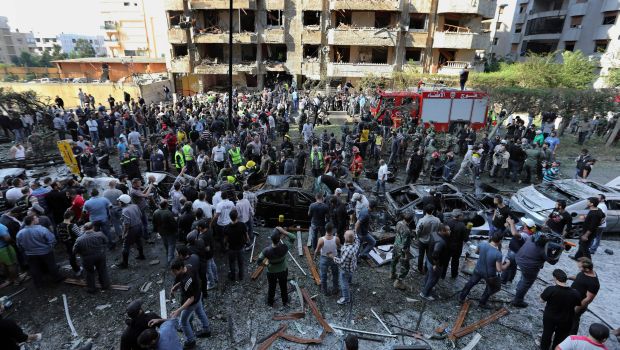
In this file photo taken Tuesday, Nov. 19, 2013, Lebanese people gather at the scene where two explosions have struck near the Iranian Embassy in Beirut, Lebanon (AP Photo/Bilal Hussein, File)
Lebanese Justice Minister Shakib Qortbawi said on Sunday that Acting Public Prosecutor Judge Samir Hamoud had appointed a forensic physician to examine the case, who reported that Majid’s death was caused by “three health issues: kidney failure, a virus which caused brain damage, and pulmonary problems.”
Majid, who was wanted in Lebanon and Saudi Arabia on terrorism charges, was the head of the group which reportedly claimed responsibility for a double suicide bombing of the Iranian embassy in Beirut in November. The attack killed more than 20 people, including the Iranian cultural attaché.
He was arrested by Lebanese security forces last week, and died while being treated in a military hospital.
Following the Lebanese report, the chairman of the Iranian parliament’s National Security and Foreign Policy Committee, Alaeddin Boroujerdi, said: “Tehran will send a team to Lebanon to investigate the death of Majid Al-Majid.”
He added: “According to the current circumstances, it is important for the Lebanese government to identify the cause of Al-Majid’s death and provide a report.”
The Lebanese army command announced Majid’s arrest on Friday after verifying his identity by DNA tests. He was sentenced by a Lebanese court in 2009 to life in prison on terrorism charges.
In the meantime, investigations have continued into the Dahiyeh explosion on Thursday, a day after the Islamic State of Iraq and Syria (ISIS) announced its responsibility for the attack, which they said was in retaliation for Hezbollah’s intervention in Syria on behalf of President Bashar Al-Assad’s government.
In the wake of the bombing, Lebanese MPs continue to trade accusations as to where the ultimate responsibility for the spillover of the Syrian conflict into Lebanon lies.
The leader of Hezbollah’s parliamentary coalition, MP Mohammad Raad, said: “These takfirists will definitely fall, but what is required of us is to be patient and persevere, and adhere to our approach.”
Raad added during a religious event on Sunday: “Every time an explosion or a terrorist attack takes place we hear the same old tune, that they condemn the perpetrator, but that the reason is Hezbollah’s intervention in Syria.”
Raad asked: “What would the situation be in our country if Hezbollah had not fought on the Lebanese-Syrian border to protect our people and stop these takfirists controlling our borders?”
Raad called on critics of Hezbollah’s intervention in Syria to “think about what would happen if those terrorists took control of Syria and the border; where would Lebanon’s security and the right to free expression be under the oppression of those who know nothing about religion?”
The deputy chief executive of Hezbollah, Sheikh Nabil Qawooq, said: “Whatever the volume of car-bombs we will not change our position on Syria or in Lebanon, and the situation will not change there.”
He stressed that “the response to the takfirists’ crimes should be to expedite the formation of a national unity government which closes the doors to the terrorist takfirists and bolsters stability and national unity, with the priority of the government being the agreement on a national strategy to confront takfirist terrorism that threatens the nation and all the Lebanese people, because the issue is not one of targeting Hezbollah and the Shi’ites in the south and in Dahiyeh. What these people want is to ignite a fire in Lebanon like they did in Syria and Iraq.”
In response, Future bloc MP Khaled Al-Daher launched a scathing attack on Hezbollah, holding them responsible for the attack in Haret Hraik. He said Hezbollah “were responsible for the explosion, and they want to claim that Shi’ites are targeted to strengthen their resolve for the battle in Syria,” adding that Hezbollah was “a takfirist party which killed Syrian people and brought sedition to Lebanon.”
In a news conference on Sunday in Tripoli, north Lebanon, Daher said: “Those who opened the Syrian fire doors on Lebanon were Hezbollah. Everyone knows that worse is yet to come if Hezbollah does not stop killing Syrian people.”
